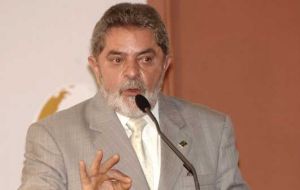MercoPress. South Atlantic News Agency
Lula openly confirms 1979 amnesty bill and silences ministers
 Lula: "Enshrine heroes and not those who killed them"
Lula: "Enshrine heroes and not those who killed them" In an attempt to cool a controversy over punishing torturers from the 21 year military dictatorship, Brazilian president Lula da Silva said Brazilians should enshrine the “heroes” of that time and not only concentrate on incriminating the “villains” who killed them.
Contrary to Southern Cone neighbors, Brazil never reviewed a 1979 amnesty bill from the military regime which liberated political prisoners and extended an amnesty to the military and security forces that could have been involved in alleged human rights excesses. Two of his cabinet ministers, Justice and Human Rights were considering that the 1979 amnesty should not include "torturers", but President Lula da Silva ordered them out of the ongoing debate and recalled it was an issue for the judicial branch to decide. President Lula da Silva further took the military off the hook when he formally admitted the responsibility of the Brazilian state in the destruction of the National Union of Students seat at the beginning of the dictatorship in the early sixties. "Whenever we talk of the dead students, of the dead workers, we claim after those who killed them, when we should understand this martyrdom will not end if we don't learn to make our dead heroes, and not victims", said Lula da Silva during an official ceremony in Rio do Janeiro. "Imagine the Sandinistas from Nicaragua moaning about all those killed by dictator Somoza; imagine Fidel Castro spending all his time claiming over those killed by dictator Batista", added the Brazilian president. According to Brazilian political analysts Lula da Silva's statements were geared to the military, restless about his two ministers interpretation that the military and policemen involved in human rights violations during the dictatorship should be taken to court. "The issue is over. The president has taken a decision" said the Brazilian Navy commander Julio Soares, supported by his counterparts from the Army, Enzo Peri and from the Air Force Juniti Saito Lula da Silva strong words apparently have sealed the growing debate which based on the fact that international treaties "do not consider torture a political crime" could have opened the way to have the courts investigate human rights violations under the dictatorship when an estimated 500 Brazilian citizens disappeared. The military had replied strongly to the review proposal during a seminar held at the Military Club in Rio do Janeiro when they rejected reopening a debate on the 21 year military regime and recalled that several cabinet members including some of the promoters of the initiative, (Human Rights minister), had been members of the guerrilla fighting the military.




Top Comments
Disclaimer & comment rulesCommenting for this story is now closed.
If you have a Facebook account, become a fan and comment on our Facebook Page!